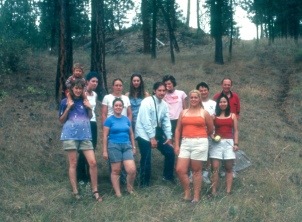
|
|||||||||||
EVSC
491-3 Advanced Field Studies in Environmental Science
|
Prerequisite: This course is for students in the Environmental Science Program who are nearing degree completion, preferably with at least 30 upper division credit hours. The requirement for honours standing has been dropped. In addition, students not in the program may be admitted if space is available. If you’d like to take the course, contact me (routledg@stat.sfu.ca) about the suitability of your background and the availability of space. Overview: This course will give students an opportunity to develop expertise in both (i) the technical aspects of taking field observations and (ii) the process of designing, running, analyzing, and reporting on an environmental assessment. There will be two segments to the field work. The first will focus on technical measurement taking for ongoing monitoring projects on Burnaby Mountain and elsewhere in the Lower Mainland. |
Schedule:
Pre-Course Research Essay: Students will be required to appraise key research articles and reports, with a view to designing an informative and useful study in the second week of the course. Full details will be available by May 5. |
 EVSC 491 participants eating dinner at UBC Geology Field Camp, Oliver, BC. |
Lower Mainland Component: The monitoring program in the Lower Mainland will provide an opportunity to hone valuable field skills. Students will gain experience in using field instruments for measuring such items as stream flow and ionic concentrations in water, in identifying and assessing abundances of plant species, and in conducting stream surveys. But the course will be more than just a learning experience. For example, the vegetation component will provide evidence related to the health of a riparian area near the headwaters of Stoney Creek. This will in fact be the third in an ongoing set of annual observations designed to monitor key ecosystems in the lower mainland. Details of the monitoring projects will be determined in consultation with the City of Burnaby, Simon Fraser University’s Burnaby Mountain Development Corporation, and possibly other local governments.
The lower mainland monitoring project will include the following components: (i) a vegetation survey, (ii) a stream survey, and (iii) further work on water-quality monitoring.
Okanagan Study: Students will design and run the study in the second week of the field course. They will complete the data analysis and write the report by the end of the first week of the fall semester. (Every effort will be made to ensure that grades are assigned in time to meet deadlines for students about to complete their degree requirements.)
Grading:
- Pre-Course Research Essay 25%
- Participation 10%
- Miscellaneous Reports 10%
- Plant Specimens 10%
- Plant Identification Test 20%
- Contribution to
Final Report 25%
Letter Grades: Final percent scores will then be converted to letter grades using the following criteria:
- A: Solid technical performance in all aspects of the work, with exceptional skills in such areas as goal setting, problem solving, generating group cohesion, or technical writing.
- B: Good technical performance and substantive contributions to all aspects of the course.
- C: Basic understanding of the techniques and solid effort, but identifiable weaknesses that need to be addressed if the techniques and concepts are to be thoroughly mastered..
- D: Minimally acceptable performance. Major deficiencies that must be addressed before continuing in the area.
- F: Unacceptable performance.
Unless other arrangements
are made, any written work will be returned in class sessions, and the
final grades will be posted by student number outside the instructor’s
office. Students wishing to make alternative arrangements to further protect
confidentiality should consult the instructor.
